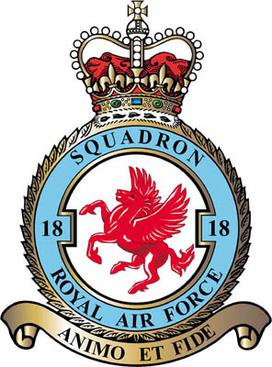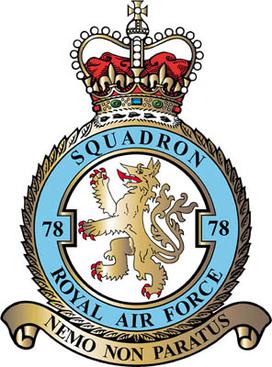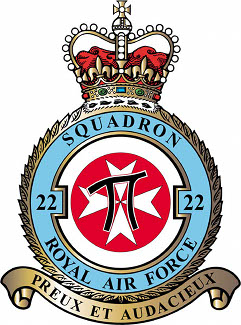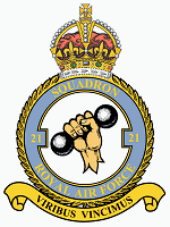
Number 3 Squadron, also known as No. 3 (Fighter) Squadron, of the Royal Air Force operates the Eurofighter Typhoon FGR4 from RAF Coningsby, Lincolnshire, since reforming on 1 April 2006. It was first formed on 13 May 1912 as one of the first squadrons of the Royal Flying Corps – being the first to fly heavier than air aircraft.

No. 7 Squadron of the Royal Air Force operates the Boeing Chinook HC6 from RAF Odiham, Hampshire.

No. 18 Squadron of the Royal Air Force operates the Boeing Chinook from RAF Odiham. Owing to its heritage as a bomber squadron, it is also known as No. 18 (B) Squadron.

No. 78 Squadron of the Royal Air Force, is the squadron number plate of RAF (Unit) Swanwick based at London Area Control Centre, Swanwick, Hampshire. The squadron was allocated the role in early 2021.

No. 14 Squadron of the Royal Air Force currently operates the Beechcraft Shadow R1 in the Intelligence, surveillance, target acquisition, and reconnaissance (ISTAR) role from RAF Waddington.

Number 28 Squadron, also known as No. 28 Squadron or No. 28 (AC) Squadron, is a squadron of the Royal Air Force. Based at RAF Benson, it serves as the RAF's Operational Conversion Unit for the Westland Puma HC2 and Boeing Chinook HC5/6/6A helicopters.

No. 84 Squadron of the Royal Air Force is at present a Search and Rescue Squadron based at RAF Akrotiri, using the Puma HC Mk.2 helicopter. The squadron transitioned from the previously operated Bell Griffin HAR.2 to the Puma HC Mk.2 in 2023.

Number 22 Squadron of the Royal Air Force is an operational testing and evaluation squadron for all the Joint Helicopter Command helicopter types including Chinook, Puma HC2, Merlin HC4, Apache and Wildcat AH1. Formerly the Rotary Wing Operational Evaluation and Training Unit, the highly experienced helicopter aircrew will also ensure frontline crews have Qualified Warfare Instructors to support them on operations worldwide. The squadron was reformed in May 2020 to serve as the Joint Helicopter Command Operational Evaluation Unit.

No. 202 Squadron of the Royal Air Force is the maritime and mountains training element of the No.1 Flying Training School, operating the Airbus Helicopters H145 Jupiter.

No. 21 Squadron of the Royal Air Force was formed in 1915 and was disbanded for the last time in 1979.
No 36 Squadron of the Royal Flying Corps was formed at Cramlington in 1916 and was disbanded for the last time in 1975.
No. 280 Squadron was a Royal Air Force air-sea rescue squadron during the second world war.
No. 52 Squadron was a Royal Air Force squadron that saw service in both World War I and World War II.

No. 500 Squadron AAF was a Royal Air Force flying squadron. It was initially formed in 1931 as a Special Reserve squadron and in 1936 became part of the Auxiliary Air Force, at this time based at Manston and Detling.
No. 293 Squadron was a Royal Air Force air-sea rescue squadron. During the Second World War the unit operated search and rescue missions for Allied aircraft operating over Italy.
No. 294 Squadron was a Royal Air Force air search and rescue (ASR) squadron active under RAF Middle East Command. During the second world war the unit operated rescue missions for Allied aircraft and aircrew over the eastern Mediterranean and later the Persian Gulf and Arabian sea.
No. 621 Squadron RAF was a reconnaissance squadron of the Royal Air Force during World War II, flying from Somaliland and Aden. It was after the war stationed in Egypt and Palestine and tasked with air-sea rescue and was also active in Operation Sunburn, looking for illegal immigrants.
No. 144 Squadron RAF was a squadron of the British Royal Air Force. It was first formed in 1918 during the First World War, operating as a bomber squadron in the Middle East. It reformed in 1937, serving in the bomber and anti-shipping roles during the Second World War. A third incarnation saw the squadron serving as a strategic missile squadron during the late 1950s and early 1960s.
No. 292 Squadron RAF was an air-sea rescue (ASR) squadron of the Royal Air Force operating in the Bay of Bengal during the Second World War.

No 279 Squadron RAF was a Royal Air Force air-sea rescue squadron of World War II. The squadron was formed on 16 November 1941 and disbanded on 10 March 1946.











